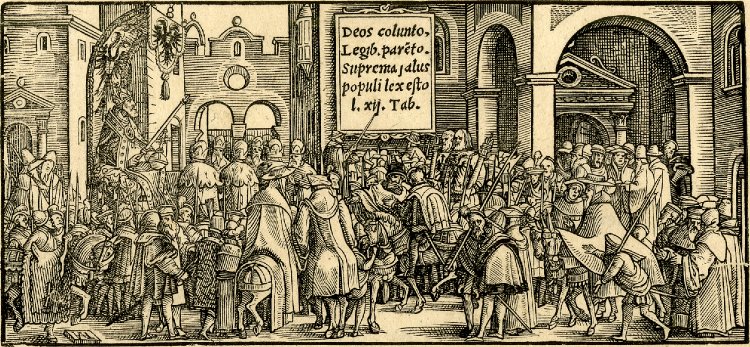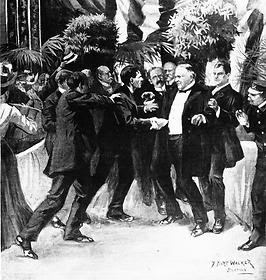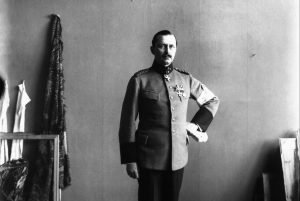In 1517, when the 95 Theses were first posted, Martin Luther had no intention of breaking from the Roman Catholic Church. Rather, he sought to reform the Church’s view on indulgences, believing that no one could buy their way into heaven. Believing that his view was deeply rooted in Scripture, he was confident that Church scholars would agree with him. Instead, the Church hierarchy responded by accusing Luther of heresy, wanting to quell any question of their authority. As a result, what was initially an effort to reform the Catholic faith eventually transformed into a major schism in Christianity itself.

Prior to sparking the Protestant movement, Martin Luther was an Augustinian monk teaching at the University of Wittenberg in Germany. In 1517, Pope Leo X sanctioned indulgences to be sold to raise money for the construction of St. Peter’s Basilica in Rome. An indulgence consisted of money given to the Church in exchange for less time in purgatory, which was conceived as a theological waiting room where imperfect souls were purified after death before they enter heaven. People essentially believed that this meant they could buy a way into heaven for themselves and their loved ones.1 As a result of the Pope’s decree, a Dominican monk, Johann Tetzel, began preaching in favor of these indulgences in the towns of Jüterbog and Zerbst near the university.2 Luther responded to this by writing to the archbishop, admonishing him by asserting that simply paying money to the Church does not purify the soul.
When his protestations went unanswered, Luther posted his 95 Theses. The theses were arguments opposing the manner in which indulgences were being sold.3 Most of the theses did not contradict Catholic doctrine, so it is widely believed that Luther wrote them to spark a theological academic debate. The theses, originally written in Latin, were translated into German and put into wide circulation; this caught the attention of Rome. Fearing that the funding for St. Peter’s Basilica was under threat, Leo ordered Luther to be investigated. In response, Luther sought the support of a Germanic prince, Frederick the Wise. Frederick granted Luther support and protection, insisting that the investigation take place in Germany.4 In response, Leo asked the papal legate in Augsburg, Cardinal Cajetan, to investigate Luther. Brought before Cajetan, Luther was asked to renounce his theses and recant his accusations against the Church. Luther refused, but agreed to stop commenting on indulgences and listen to the Church. Although this was not Cajetan’s desired result, Frederick allowed Luther to return to Wittenberg.5

The following year, 1519, Luther agreed to debate the theologian Johann Eck. Eck instigated the debate by comparing Luther’s positions to Jan Hus, a well-known heretic that had been excommunicated and executed a hundred years earlier. This forced Luther to declare that the Church had been wrong to condemn Hus, opening himself to charges of heresy.6 Eck had given the pope the opportunity to bring excommunication charges against Luther. However, the Holy Roman Emperor Charles V, not wanting to upset Frederick the Wise, forced the pope to subject Luther to a hearing at the Diet of Worms. At this time, Luther’s cause was gaining popularity among Germans. The emperor could not afford to upset the German prince, needing his support to fight an ongoing war with France and keep the Ottoman Empire from Austrian lands.7
During the trial, Luther was led into a room where his accusers had piled his works on a table, read the titles aloud, and asked if these books belonged to Luther. Luther replied that the books belonged to him. He was then asked to renounce them. Luther then asked for time to consider. When he returned the next day he refused to reject anything, saying that unless he was disproved by Scripture, he was bound by his conscience to defend his work.8 He felt that he was strongly supported by the Bible. However, Church officials saw this as a rejection of their authority rather than an appeal to Scripture. Charles V, though angered, could do nothing to condemn Luther as long as he remained at war. Instead, he planned to send Luther back to Wittenberg marked as a heretic.9 However, before he reached the university, Frederick the Wise secretly had Luther taken to Wartburg Castle.10
Throughout the next few years, Luther continued to defend his works. One of his biggest achievement during this time was the translation of the Bible from Latin into German. Still, he was forced to remain hidden. Charles V, after securing an alliance with the pope in the war against France, no longer needed ties with Frederick the Wise. This allowed the papal bull, proclaiming Luther’s excommunication, to be issued, adding a decree which ordered that no one give Luther refuge.11 It was ultimately his refusal to retract his works that prevented Luther from reforming the Church. Pope Leo X, Charles V, and other high Church officials perceived Luther’s passion for reform as a challenge to authority. In contrast, Luther believed that his works were strongly supported in Scripture. The miscommunication and stubbornness of both parties ultimately led to a major schism within Christianity. When the Church labeled him a heretic, Luther had no choice but to begin his own branch of Christianity, Lutheranism, so that he could continue to practice the faith to which he had dedicated his life.
- Renaissance and Reformation Reference Library, July 2002, s.v. “Martin Luther: Founder of Lutheranism” edited by Julie L. Carnegie. ↵
- New Catholic Encyclopedia, September 2003, s.v. “Luther, Martin” by Bill Ditewig. ↵
- Funk and Wagnalls New World Encyclopedia, 2016, s.v. “Luther, Martin” ↵
- Renaissance and Reformation Reference Library, July 2002, s.v. “Martin Luther: Founder of Lutheranism” edited by Julie L. Carnegie. ↵
- New Catholic Encyclopedia, September 2003, s.v. “Luther, Martin” by Bill Ditewig. ↵
- Renaissance and Reformation Reference Library, July 2002, s.v. “Martin Luther: Founder of Lutheranism” edited by Julie L. Carnegie. ↵
- Renaissance and Reformation Reference Library, July 2002, s.v. “Martin Luther: Founder of Lutheranism” edited by Julie L. Carnegie. ↵
- Encyclopedia of World Biography, December 2004, s.v. “Martin Luther,” by Andrea Henderson. ↵
- Julius Koestlin, Life of Luther (Project Gutenberg Literary Archive Foundation, 2006), 105-116. ↵
- Funk and Wagnalls New World Encyclopedia, 2016, s.v. “Luther, Martin” ↵
- Julius Koestlin, Life of Luther (Project Gutenberg Literary Archive Foundation, 2006), 105-116. ↵



94 comments
Rosa Robledo Martinez
I never would have imagine labeling Martin Luther as a “rebel”, because he has made a major impact in history. Martin Luther was wrongly accused, but even with all the consequences he had to suffer he still practiced his faith no matter what people may think of him. This article gives a good amount of valid information that I did not know of, but I am glad that I learned something more about him.
Kenneth Gilley
What an interesting article! It is quite admirable that Martin Luther held onto what he believed to be right even in the face of excommunication. The rebel/reformer debate about him is quite curious. While he looked on himself as a reformer trying to correct what he saw to be misguided principles in the Church, the papacy saw him as a rebel. Either way, Martin Luther had a tremendous impact on the world that is still very evident today.
Sofia Martinez
MLK being wrongly accused by the church, even through all the trouble and the punishment that he was put under, he still practiced his faith. This article has given me information that I did not know of since the only thing that I knew about Martin Luther King Jr. was the only background that I knew of him, I’m glad that this article puts it to perspective.
Thalia Romo
It’s odd to think of Martin Luther to be labeled as a “rebel” due to the impact he has had on history. He definitely would have been a rebel during his time since he was breaking some rules and going against the church, which had the ultimate power during the 1500s. However, Martin Luther impact on not only society but religious beliefs was phenomenal and continues to live on till this day.
Azucena Cuevas
I enjoyed the article because it displays the nature of the Catholic Church and how corrupt it was. Luther was correct to go against it because it is ridiculous to tell people giving money to the church can potentially get you into heaven (of course among many other faults the church had). Luther had no intent to break from the church, only to reform it and fix the corruption that was overtaking the church.
Margaret Maguire
I have heard of Martin Luther and his 95 Theses that he wrote against the church. The church at the time said that the only way to get to heaven was to buy your way in. I think the history of how Luther came up with his ideas were really interesting and he started speaking out against the way the church was run. This was a really interesting article.
Kelsey Sanchez
I really know the background story of MLK, but this one expresses other decisions and beliefs he had and what led him to believe in such things. It was amazing to see how the church would punish him, but overall he seemed that he loved the church and simply just had other beliefs. His decisions were influenced by the church itself. I liked the fact at the end that he was able to begin his own branch of Christianity, Lutheranism, so that he could continue to practice the faith to which he dedicated his life.
Michael Lazcano
The story of the Protestant Reformation, and Martin Luther has always been something mentioned within various religion classes I have had over the years but never gone to in depth on the matter, this article solved that problem. While I knew his gripes with the church and the corruption at the time of this reform. The idea of indulgences seems totally ludicrous to us now but back then the church governed how we lived our lives and what they said was generally followed without any word against it. I also enjoyed how the article showed how he wanted to fix the church’s problems rather then make his own, he may have not fully intended for the consequences which followed his postings of the 95 Theses but his motivation was very noble and admirable.
Raul Vallejo
It’s crazy to think about how so many people were fooled to believe that the church was doing the right thing, even though the church had became corrupt. Martin Luther had the right idea and got banished which almost proves how some times people wont decide to follow the truth some times due to not being able to accept the truth.
Michael Thompson
I think that this interesting, as today there is still a lot of fighting on what is right and wrong, especially in the catholic church, and especially regarding what is taught in the bible. I think that such a movement is important to recognize, because I think in the end, it forced the Catholic church to change for the better and not use their power to get money. Protests are still being used against the church today, and it is causing change for the better, showing that protests, as long as civil, could be for the best.